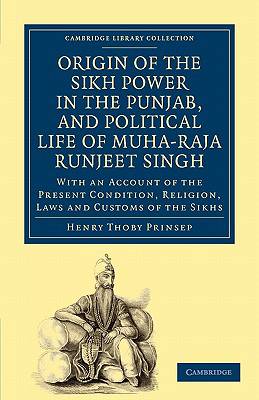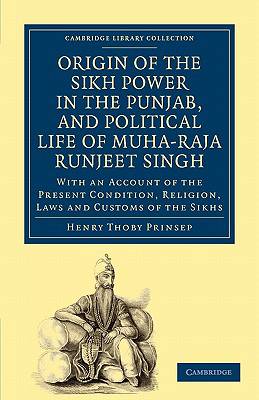
Door een staking bij bpost kan je online bestelling op dit moment iets langer onderweg zijn dan voorzien. Dringend iets nodig? Onze winkels ontvangen jou met open armen!
- Afhalen na 1 uur in een winkel met voorraad
- Gratis thuislevering in België vanaf € 30
- Ruim aanbod met 7 miljoen producten
Door een staking bij bpost kan je online bestelling op dit moment iets langer onderweg zijn dan voorzien. Dringend iets nodig? Onze winkels ontvangen jou met open armen!
- Afhalen na 1 uur in een winkel met voorraad
- Gratis thuislevering in België vanaf € 30
- Ruim aanbod met 7 miljoen producten
Zoeken
Origin of the Sikh Power in the Punjab, and Political Life of Muha-Raja Runjeet Singh
With an Account of the Present Condition, Religion, Laws and Cu
Henry Thoby Prinsep
€ 62,95
+ 125 punten
Omschrijving
Henry T. Prinsep (1792-1878) began his career in India with the East India Company in 1807 and worked in various posts, finally being appointed Persian secretary before retiring in 1843. Throughout his career, and into his retirement, he wrote a number of books about India. The present work, however, published in 1834, is a report taken from information gathered by the late political agent at Umbala, Captain William Murray, whose death made it necessary for other officials to ready the work for publication. The report looks at the history of the Sikh people and the rise of Runjeet (Ranjit) Singh (1780-1839). After Singh died, his empire began to weaken, and by 1845 the British were at war with the Sikhs. This work provides a view of the Punjab during a critical point in its history.
Specificaties
Betrokkenen
- Auteur(s):
- Uitgeverij:
Inhoud
- Aantal bladzijden:
- 268
- Taal:
- Engels
- Reeks:
Eigenschappen
- Productcode (EAN):
- 9781108028721
- Verschijningsdatum:
- 30/06/2011
- Uitvoering:
- Paperback
- Formaat:
- Trade paperback (VS)
- Afmetingen:
- 140 mm x 216 mm
- Gewicht:
- 344 g

Alleen bij Standaard Boekhandel
+ 125 punten op je klantenkaart van Standaard Boekhandel
Beoordelingen
We publiceren alleen reviews die voldoen aan de voorwaarden voor reviews. Bekijk onze voorwaarden voor reviews.











